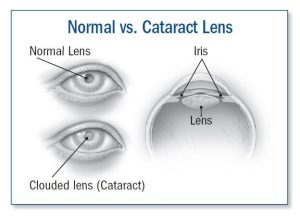Diagnosing and Treating Cataracts
May 2023
A cataract is a common eye condition where the lens becomes progressively opaque, resulting in blurred vision. Cataracts can be compared to a dirty camera lens or a foggy window.
Symptoms: Symptoms include blurred vision (especially in bright light), double vision, difficulty reading or seeing clearly in the distance, difficulty driving at night, changes in the appearance of colors, especially fadingor general yellowing, and frequent eye prescription changes.
Causes: There are many causes of cataract formation; however, aging is the most common. As people grow older, changes to the protein that makes up the lens can occur, leading to the development of cloudy areas. Cataracts can be hereditary. Injury to the eye, medical problems such as diabetes and other eye diseases, or some medications (Ex. steroids) may also cause or be associated with cataract formation.
Diagnosis: A thorough eye examination by an ophthalmologist will determine whether a cataract is present.
Risk Factors: Research suggests that some factors may increase the risk of age-related cataracts forming, including:
- Diabetes
- Family history of cataracts
- Use of steroid medication over time
- Poor diet and smoking
- Excessive exposure to sunlight over time
Treatment: Surgery will be considered when a cataract causes enough vision loss to interfere with daily activities such as working, driving, reading, or watching TV. Surgery is the only effective way to remove a cataract and is usually performed in a hospital’s operating theatre under a local anesthetic. If you have any questions or concerns about cataract care, please discuss these with your provider or an ophthalmologist.
More Stories
World Diabetes Day
November 2024 | Awareness HolidayEvery 23 seconds, someone in the U.S. is diagnosed with diabetes. Those living with diabetes face many obstacles in their…
International Infection Prevention Week
October 2024 | Awareness HolidayOctober 13-19 is International Infection Prevention Week. Observed each third week of October, this week is dedicated to highlighting the…
October is Breast Cancer Awareness Month
October 2024 | From our DesksOctober is Breast Cancer Awareness Month, a time dedicated to spreading awareness about the impact of breast cancer and the…

